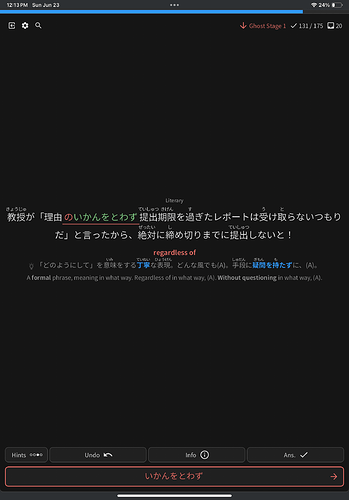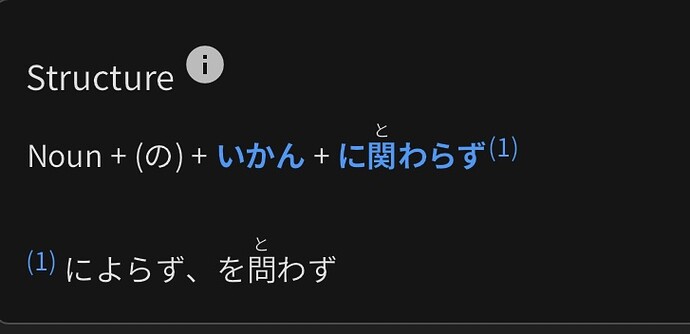Are there certain cases where の is required when using 如によらず? What’s the difference between using or not, apart from including it being more formal / complete?
I dug into this a bit and I’m pretty sure this review is just missing that being a potential answer since いかんによらず is accepted. Not to mention, another review also accepts 理由いかんを問わず as being correct. I did write some stuff below if you want to check it out, but I’m pretty sure it’s wrong.
Me yappin
I used this link to help me draw this conclusion (see the first response by Jwscorch).
Think about it this way. When you have の, we’re saying that whatever is attached belongs to what comes before. So a few examples:
- 日本語のクラス is - Class of the Japanese (language).
- 勝敗の如何… - Victory/defeat’s circumstance(s)
- 理由の如何ん… - Circumstances of (your) reason
Now, in English we can create compound words by putting two words together. However, we can’t do this with all words.
Looking at the above examples sentences, let’s see what they’d look like without の:
- 日本語クラス - Japanese class
- 勝敗如何 - Winning/losing circumstance(s)
- 理由如何 - Reason circumstance(s)
The first two, in English, make sense. However, the same can’t be said for “reason circumstance(s)”. I’m pretty sure this is the same reason why this wouldn’t work in Japanese, because it just doesn’t work to combine a larger compound. So instead, の needs to be used to show the relationship between the two nouns.
However, I’m not entirely sure how feasible this really is, since it looks like all of Bunpro’s reviews (besides this one) allow の to be optional. I would assume something like 結果如何を問わず would not work (regardless of result circumstances) but it’s accepted. Same with 理由いかんを問わず also being accepted in a different review.
 So I’m pretty sure I’m just yappin at this point, but oh well.
So I’m pretty sure I’m just yappin at this point, but oh well.


